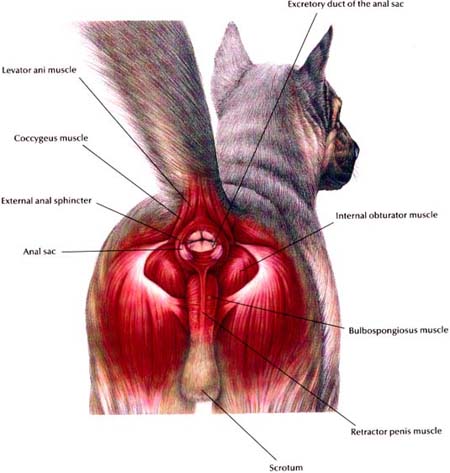Anal gland disease is a common reason we examine dogs and to a lesser extent cats.
What exactly are anal glands?
The anal glands are secretory organs that are found near the rectum in dogs and cats. The secretions are stored in small sacs. The anal sacs are located at about the 5 and 7 o’clock positions near the dogs anus. The anal sacs usually release a small amount of fluid when they defecate which are thought to act as a scent marking (and part of the ‘story’ dogs get when smelling the faeces of other dogs). The fluid from the anal sacs may also be released when an animal is frightened. Anal gland secretions have a distinctive fishy smell. Occasionally the anal sacs may leak a small amount of brown fluid onto the bedding that your pet is sitting on.
In some dogs and cats the anal sacs do not appear to empty as well as they perhaps should, and are prone to becoming blocked or impacted. On occasions they may also be come infected or abscessed.
Symptoms of anal gland problems:
These may include your dog rubbing their bottom along the ground (known as scooting), biting at the bottom or pain when defecation. Anal gland or sac infections, masses or abscesses may cause a visible swelling alongside the anus.
Treatment:
Most of the time if the anal sacs become blocked or impacted it is possible to manually empty the sacs by gently expressing them manually. Increasing the fibre content of the pet’s diet may also reduce the severity or frequency of anal gland blockage or impaction. If it is not possible to express the gland manually you veterinarian may sedate or anaesthetise your pet and use a small catheter to flush the debris out of the sac. If the anal glands become infected your pet may need a course of antibiotics and anti-inflammatories.
Fortunately most complications are short term will resolve with management by your veterinarian.
In the event your pet’s anal sac infections do not respond to treatment, or if your veterinarian becomes concerned there may be another underlying condition such as a tumour of the anal gland it is possible to surgically remove the anal gland and sac. The surgical procedure is fairly delicate as the nerves that control the muscles around the anus run close to the anal glands so there is some risk of faecal incontinence, and there is a risk of wound infection due to the close association with the anus.
For more information on this topic please phone us on 4362 1644.


